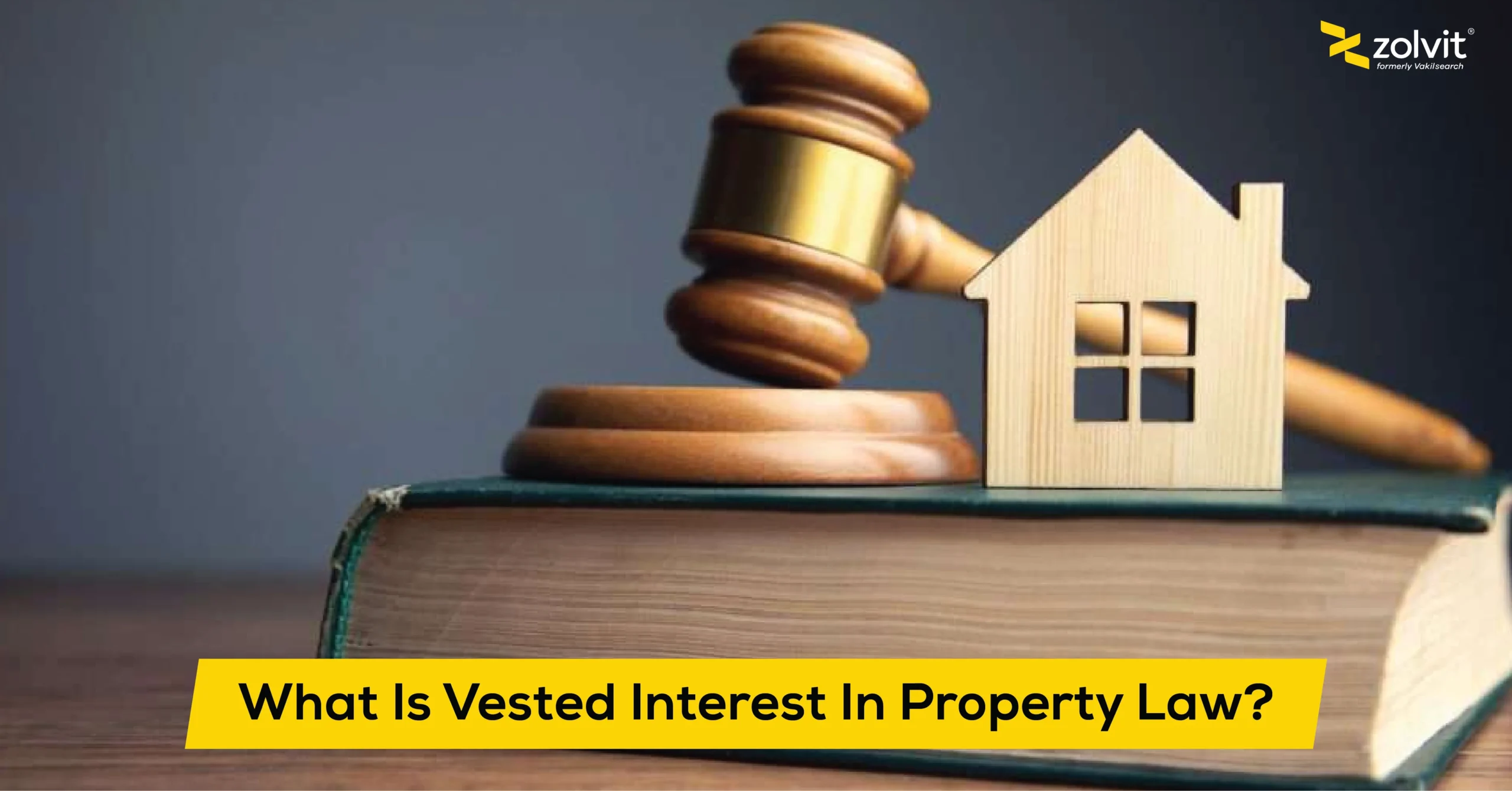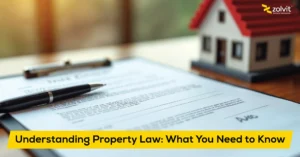A vested interest in property law relates to a legal right that a person owns over a property but cannot exercise this for instant possession. This right is fixed and mostly derived from some legal documents such as wills or trust deeds.
In this blog, we highlight vested interests in property law, covering their types, legal framework, and impact on ownership. It explains key distinctions from contingent interests and addresses common legal issues.
What is a Vested Interest?
An interest vested is a claim, that is, rightful by a person in something that is generally investment or project related; it becomes personally relevant once the application of financial gain or loss takes place. In terms of finances, it usually means a legal right over assets allocated or accumulated for future use.
Why Vested Interests Matter in Property Transactions
Vested interests are very important in property transactions since they offer clarity and security to the parties involved. To the buyers, sellers, and inheritors, vested interests are important because they help in avoiding disputes and legal complications that may arise in the transfer or inheritance of the property. They ensure that the rights of a property are protected and can be transferred or inherited with certainty.
Types of Vested Interests
These are two main types of vested interests that determine ownership rights in property law. Whether recognised legally or equitably, they ensure rightful claims in life estates and future property transfers.
Legal vs. Equitable Vested Interests
| Type | Description |
| Legal Vested Interests | Rights recognized and enforceable by law. The holder has a guaranteed entitlement to the property, protected by legal courts. |
| Equitable Vested Interests | These interests are also derived in equity. They have their basis not in legal rights but in fair justice. Although equitable interests are often not enforceable by traditional channels of law, they can still be protected using remedies available at the court of equity. |
Vested Interest in Life Estates
A life estate is one interest in land that lasts until the end of the life of a specific individual, known as the life tenant. The life tenant has a vested interest in it because he may use and enjoy it during his lifetime. But when the life tenant dies, the property devolves to yet another individual or entity, with a vested remainder interest.
Vested Remainder Interests
A vested remainder is a type of future interest in property, which automatically vests in the holder upon the termination of a prior estate, for example, life estate. In the case of a vested remainder interest, the holder has an absolute and unconditional right to take possession of the property once the prior estate ends without the fulfillment of any other condition.
Legal Framework of Vested Interests
The legal framework governing vested interests ensures transparency concerning property rights and their enforcement. Key provisions, rights, and conditions define vested interests under the law.
Section 19 of the Transfer of Property Act, 1882
In India, Section 19 of the Transfer of Property Act, 1882 provides the legal basis for vested interests. This section outlines the conditions under which an interest in property is considered vested, stating that an interest is vested when the rights to the property are secured, definite, and not contingent upon a condition precedent. A vested interest holder has the right to enforce their claim over the property once the conditions are met.
Legal Rights of Vested Interest Holders
Vested interest holders have a number of fundamental legal rights:
- Transferability: The holder can transfer or assign their vested interest to other people, except where the agreement prohibits it.
- Inheritance: A vested interest is normally inheritable. If the holder dies, then his interest is passed on to his legal heirs.
- Right to Enforce: The holder has the right to legally enforce their interest in the property, ensuring their entitlement to ownership or possession.
Conditions for Vested Interests to Become Effective
For a vested interest to be legally effective, it must meet the following conditions:
- Certainty: The interest must be definite and not dependent on a future event.
- Identifiable: The property and the individual or entity entitled to the interest must be clearly identified.
- Right to Possession: While possession may be deferred, the right to possess or enjoy the property is guaranteed.
Vested Interest vs. Contingent Interest
Vesting interests determine the assignment and enforcement of property rights: whereas among vested interests there is confidence in ownership, shall have conditional import in and of itself with other contingent interests on the events, making them conditional.
Differences Between Vested and Contingent Interests
The key difference lies in whether the right is immediate and guaranteed or dependent on a future event. The table below outlines these distinctions:
| Aspect | Vested Interest | Contingent Interest |
| Definition | A vested interest is a right that is already established in property without any future conditions. | Gives right to the interest contingent upon a given event occurring. |
| Nature | This right is assured and does not depend upon any future event. | It is uncertain and will take effect only under the circumstance defined. |
| Possession | Can involve a present right to income or a future right to enjoyment. | The right may never come to being should the said condition be left unfulfilled. |
| Example | Inherit property when a family member dies. | For example, creating a trust for the benefit of grandchildren is a contingent interest. |
The Legal Implications of Vested vs. Contingent Interests
The legal consequences of vested and contingent interests vary according to their degree of certainty, transferability, and enforceability. The following table draws out such.
| Aspect | Vested Interest | Contingent Interest |
| Certainty | Guaranteed and not subject to future conditions. | Uncertain and depends on a specific event occurring. |
| Transferability | Can usually be transferred, sold, or inherited. | Cannot be transferred until the condition is fulfilled. |
| Enforceability | Legally enforceable, even if possession is delayed. | Not enforceable until the specified event happens. |
| Risk of Loss | No risk of losing interest due to future events. | The interest may never materialise if the condition fails. |
How Vested Interests Impact Property Ownership
The interests that vested are recognised as being of great importance in property ownership because such interests provide legal certainty and stability. They influence property titles, transfers, and value, ensuring secure transactions and reducing ownership disputes.
Vested Interests and Property Title
Vested interests affect property titles by ensuring that rights to the property are well defined. A vested interest ensures that the holder’s claim is recognized in legal records and that future transfers or inheritances will be honored.
Vested Interest in Property Transfers
In property transfers, the holder of a vested interest may sell, lease, or otherwise deal with the property, subject to the terms of the agreement. Vested interests in property make transactions more predictable and secure, as they assure that the property rights will not change unexpectedly.
Effect of Vested Interests on Property Value
Properties with vested interests usually have higher legal certainty, which may add to their market value. The buyers and sellers are more likely to enter into transactions where the property rights are well established, and there is minimal risk of future disputes over ownership.
Common Issues Related to Vested Interests
At times conflicting claims or the complexity of transfer will engender disputes over vested interest. However, mediation and/or litigation provide the legal context for clarifying ownership and allowing just settlement.
Disputes Over Vested Interest Rights
In situations where the vested interest owner claims the property before the stated time or in cases where multiple parties have vested interests conflicting with each other, legal action might be required to settle such a dispute.
Challenges in Property Transfers Involving Vested Interests
Transferring a property with vested interest can be a bit complicated, especially when other people have interest claims and competing interests. The process requires careful documentation, due diligence in the laws, and clarity on the vested interests.
Legal Methods for Resolving Vested Interest Disputes
Vested interest disputes can be legally resolved through mediation and other means such as:
- Mediation: A neutral third party assists the parties to reach an agreement.
- Litigation: If the conflict is serious, it may require going to court in order to establish or clarify vested interest rights.
Role of Property Lawyers in Vested Interest Matters
The role of property lawyers in vested interest matters in legal clarity and protection. They assist in interpreting legal documents, securing property rights, and resolving disputes through negotiation, mediation, or litigation.
- Legal Consultation on Vested Interests: Property lawyers advise clients on vested interests. They will interpret legal documents and advise them on how to protect or transfer their vested interests.
- Drafting and Reviewing Contracts With Vested Interests: This law firm drafts and reviews contracts with vested interests to ensure that a client’s interest is safeguarded under property law.
- Legal Representation Regarding Litigations Between Vested Interests: Disputes, if any, can be decided either through negotiations, mediations, or court cases between vested interests where lawyers represent their clients.
Conclusion:
Vested interests ensure legal security in property ownership, but disputes can arise, requiring legal guidance. Property lawyers interpret and draft legal documents and represent clients involved in litigation. They also provide an avenue for safeguard vested interests through compliance with property laws and preventing conflicts. Life estates, remainder interests, and transfer ownership require competent legal advice regarding the states that surround them. With Zolvit’s assistance, clients can protect their property rights, resolve disputes efficiently, and vested interest issues with confidence in property transactions and ownership.
- Vested Interest vs. Contingent Interest: Vested interests are certain, while contingent interests depend on future events.
- Legal Framework: Governed by Section 19 of the Transfer of Property Act, 1882.
- Importance in Transactions: Ensures secure transfers and inheritance.
- Role of Lawyers: Legal consultation, contract drafting, and dispute resolution.
FAQs Related to Vested Interest in Property Law
How is a vested interest different from a reversionary interest?
A vested interest guarantees ownership rights, while a reversionary interest refers to a future right where property reverts to the original owner after a temporary grant.
What happens when the holder of a vested interest dies?
In most cases, vested interests are inheritable and pass on to the legal heirs of the holder unless restricted by legal provisions.
How does a vested interest impact the value of property?
Properties with vested interests usually have higher market stability and legal clarity, making them more valuable and attractive to buyers.
What is a vested remainder in property law?
A vested remainder is a future interest where ownership automatically transfers to a designated person once a prior estate (e.g., life estate) ends.
What is the interest vested in possession?
An interest vested in possession means the holder has an immediate right to enjoy or benefit from the property, rather than waiting for a future event.
How do you calculate vesting?
Vesting calculations depend on legal agreements, property deeds, or trust documents, defining when and how ownership rights are granted.
What is an example of a vested interest in property law?
If a person is named in a will as the rightful heir to a house without conditions, they hold a vested interest in the property.





